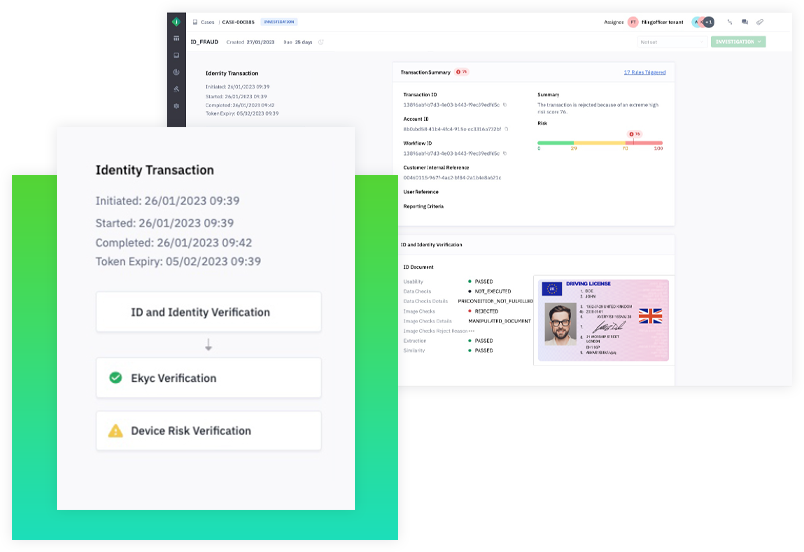
In the competitive world of eCommerce, trust is key. Accurate and secure user identification has become a priority for online businesses looking to prevent fraud and comply with regulatory requirements.
Jumio, a leader in identity verification solutions, offers a robust set of tools designed to optimize customer experience and ensure security. Stay tuned for our article, where we review how Jumio's identity verification solutions can benefit eCommerce platforms.
ID Document Verification: Is It Authentic and Valid?
The first line of defense against fraud on eCommerce platforms is ID document verification. Jumio uses advanced technology to confirm that documents presented by users, such as ID, passport, or ID card, are authentic and valid.
This process involves comparing the document provided to a global database containing the original formats of said documents, checking for security features such as holograms, watermarks, and unique fonts.
The ability to detect fake documents is essential for online businesses, as it prevents unauthorized persons from accessing sensitive accounts or making fraudulent purchases. Jumio ensures high authentication accuracy, protecting both the company and customers.
Selfie Verification with Jumio: Confirming User Identity
In addition to document verification, Jumio introduces an additional layer of security with selfie verification. This step involves the user taking a photo of themselves in real time, which will be compared to the image on their ID document. Jumio’s biometric technology verifies that both images correspond to the same person, preventing an impostor from using a stolen or borrowed document.
This verification process is not only effective at protecting against fraud, but is also fast and easy for the user, reducing friction in the authentication process without compromising security.

Document Verification with Jumio: Additional Verification for Enhanced Security
In some cases, additional documentation may be required to verify a user's identity, such as utility bills, bank statements, or credit card documents. Jumio allows users to upload this documentation, which is then automatically processed to extract and validate the information.
This step adds an extra layer of security, ensuring that the supporting documents are authentic and that the information provided matches the user's records.
This capability is especially useful for compliance with regulations such as KYC (Know Your Customer) and AML (Anti-Money Laundering), which are crucial in highly regulated industries such as finance.

Authentication: Continuous User Verification
Security in eCommerce doesn't end with the onboarding of new users. Jumio also offers solutions for continuous authentication, ensuring that returning users are who they claim to be. This is particularly useful when a customer returns to the platform and needs to access sensitive information or make a transaction.
Jumio's biometric authentication allows for fast, frictionless verification, ensuring that the user is the same person who was previously authenticated. This process not only improves security, but also simplifies the customer experience, allowing for seamless access to the platform.

Jumio Solution Highlights
Jumio stands out in the identity verification market by offering a number of advanced features that benefit eCommerce platforms:
User Experience: Dramatically reduces friction and verification time, increasing conversion rates. Users do not have to go through lengthy processes to validate their identity.
ID Document Verification: Advanced document comparison with original formats, ensuring authenticity through holograms, watermarks, and other security elements.
Compliance: Compliance with global regulations such as GDPR, PSD2, KYC, and AML, ensuring that platforms are aligned with current regulations.
Advanced Proof of Liveness Detection: Uses advanced biometric facial recognition to confirm that the user is a real person and not an impostor, preventing identity theft.
Online Corrections: If there is an error in the capture of the ID or selfie, Jumio allows for online corrections, avoiding process abandonment and improving customer satisfaction.
Data Security: Data is transmitted and stored with 256-bit AES encryption, one of the highest security standards. Additionally, Jumio is PCI Level 1 compliant.
Fraud Reduction: Through liveness testing and other verification mechanisms, Jumio provides a strong barrier against fraud, discouraging imposters who prefer not to share their images.
June Advanced Security and Fraud Reduction
Fraud remains a constant threat to eCommerce platforms. Jumio combats this problem by using advanced proof-of-liveness detection, a technology that ensures that the person making a transaction is actually the same person who was initially authenticated. This is done through biometric facial recognition, which prevents identity theft.
Additionally, Jumio offers the option to correct errors during the process, reducing the risk of user abandonment. If the document image or selfie is not captured correctly, the system prompts the user to try again instead of declining their request, improving the overall experience and reducing errors.
Jumio’s identity verification solutions provide eCommerce platforms with the tools necessary to ensure a safe and efficient user experience.
By implementing these solutions, businesses not only protect their customers and themselves from fraud, but also comply with global regulations and improve conversion rates.
With Jumio, security and customer experience go hand in hand, creating a trusted environment for both business and consumer.


